The Inverse Mechanical Turk: Meat Puppets, Silicon Strings
Humans in Name Only
These miraculous machines!
Do we shape them
Or do they shape us?
Or reshape us from our decent, far designs?
But we are learning.
We are learning to build for the future
From the ground up.
—Robert Flaherty
Men have become the tools of their tools.
—Henry David Thoreau
Above: The Modern, Inverse Mechanical Turk.
Human history is no more than a long, slow progression of incrementally trading less input for more output.
From tilling the soil with hoe in hand to driving tractors to deploying drones, the economy is driven forward and standards of living are raised by getting more bang for our financial and temporal buck.
We have entered the era of the Inverse Mechanical Turk—where humans are increasingly just the smiling faces (i.e. the frontend) slapped onto systems powered by invisible machine intelligence (i.e. the backend).
We flash toothy grins, wave our hands, and take the credit, but the real work happens elsewhere, in silicon substrates and black boxes that we barely understand.
Perplexity CEO Aravind Srinivas articulated this well with his quip “Everything is a wrapper.”
Dennis Kardonsky provides some good examples:
“OpenAI is a Nvidia wrapper
Nvidia is a TSMC wrapper
TSMC is a ASML wrapper
ASML is a sand wrapper
Sand is a silica wrapper”
If you peel back enough layers, you realize every wrapper hides the same core. That is, until the core begins to start wrapping us.
Put simply, artificial intelligence is the ventriloquist and we are all becoming dummies.
The original Mechanical Turk was a chess-playing "automaton" unveiled in 1770 by Wolfgang von Kempelen. The cabinet housed what appeared to be a sophisticated machine capable of defeating human chess masters. In reality, a human chess expert hid inside, manipulating the Turk's movements through an elaborate system of levers and magnets.1
The trick was both brilliant and convincing. Observers believed that a machine was doing complex cognitive work, when in fact a hidden human pulled the strings. The illusion persisted for decades, captivating audiences across Europe and America.
Today, the charade has inverted: The hidden machinery now powers the visible human.
In other words, we used to hide the humans inside the machine. Now we hide the machine behind the humans.
This strange new world resembles Theseus's famous paradox: the ship looks unchanged, but all its internal mechanisms have been quietly replaced. Our economy preserves the appearance of human work while silently replacing its cognitive components, leaving us to wonder who (or, more accurately, what) is truly at the helm.
Welcome to the autopilot economy, where the modern workplace increasingly resembles the cockpit of a 787.
In aviation, that “dance between man and machine, where skill, knowledge, and intuition intertwine,” the machine leads and man follows:
Sure, pilots take off, land, and intervene when things go wrong, but automated systems handle nearly everything in between.
This is happening to everything, everywhere, all at once.
During its latest earnings call, Google management disclosed that AI tools now generate more than one-third of all code across the company. The statistic covers Google’s entire engineering output and signals that AI coding assistants have moved from experiment to core infrastructure. It marks a steep jump from last year's disclosures, demonstrating rapid adoption.
The United Arab Emirates announced that it is deploying AI systems to help draft national laws and regulations, aiming to accelerate and modernize its legislative process. Officials positioned the move as a way to increase efficiency while maintaining government oversight. Put simply, governments are not just regulating AI—they are starting to govern through AI. Legislative systems themselves are beginning to automate, raising questions about transparency and accountability. In the UAE, AI isn’t just a technological issue, it’s becoming an operational layer of governance.
In high-frequency trading, the real decisions happen in microseconds, executed by algorithms optimized beyond human understanding. The traders who "oversee" these systems are merely ceremonial priests, tending to digital gods they can neither fully comprehend nor control.
A controversial new startup named Cluely now offers a suite of tools to bypass traditional evaluation methods targeting users preparing for interviews, admissions, and certifications. The product positions itself as productivity, but operates on the edge of integrity. Per its viral launch video, its product allows you to “cheat on everything.”
Duolingo CEO Luis von Ahn recently told his employees: "AI isn't just a productivity boost...Being AI-first means we will need to rethink much of how we work." His constraints included: "Headcount will only be given if a team cannot automate more of their work.”
The writing is on the wall and its message is clear: humans are now the fallback option.
Microsoft’s 2025 Work Trend Index Annual Report offers a glimpse at our collective future.
Though worth a read in full, the below slide captures this gradual progression:
We risk becoming, in the words of Erik Hoel, brain-drained “meat puppets.”
I fear that what Google Maps did to our sense of direction, AI will do to our capacity for original thought.
Microsoft’s research on The Impact of Generative AI on Critical Thinking lends credence to this idea:
In a survey of 319 knowledge workers to investigatee 1) when and how they perceive the enaction of critical thinking when using GenAI, and 2) when and why GenAI affects their effort to do so. Participants shared 936 first-hand examples of using GenAI in work tasks…Specifically, higher confidence in GenAI is associated with less critical thinking, while higher self-confidence is associated with more critical thinking. Qualitatively, GenAI shifts the nature of critical thinking toward information verification, response integration, and task stewardship.
We are slowly weaving and selling the very rope by which we will be hanged. If we’re not careful, this could be humanity in the very near future:
In this story, we are more Goose than Maverick and his ending in Top Gun is not a happy one…
All this begs the morbid, existential question: If nothing matters except what AI can do in seconds, then why should we humans matter at all?
My friend Steven Flanders interrogates this idea further in AI Has Crossed The Rubicon:
[W]hat happens to people? What do they do for money? Where do they find meaning in their life? What happens to the stock market without a perpetual 401k bid? What happens to the government without revenue from income taxes? What even is the point of going to school, or simply just working hard at anything, if there is a machine that is smarter than you, faster than you, and never sleeps? How do you climb the ladder in a world where you can no longer outsmart or outwork the incumbent?
Where does this leave us?
Where do we go from here?
What is the solution?
I haven’t the slightest idea. The words of H. L. Mencken come to mind: “For every complex problem, there is a solution that is simple, neat, and wrong.”
What I do know is that black and white has been swallowed up by gray. That is, intelligence is neither human nor artificial. It is just augmented.
The question isn't whether we'll become cyborgs. We already are.
The question is whether we'll be cyborgs with agency—pilots who understand when to engage autopilot and when to take manual control—or merely the fleshy frontend for systems that have quietly taken command.
Walter Alexander Raleigh once wrote, "The engine is the heart of an airplane, but the pilot is its soul." Our role is increasingly to be that soul, not the engine.
As we land this transformation, we should remember the words of record-setting test pilot Chuck Yeager: “If you can walk away from a landing, it's a good landing. If you use the airplane the next day, it's an outstanding landing.”
We must ensure that both humanity and technology not only survives, but thrives on the other side of this upheaval.
Bon voyage!
Per my about page, White Noise is a work of experimentation. I view it as a sort of thinking aloud, a stress testing of my nascent ideas. Through it, I hope to sharpen my opinions against the whetstone of other people’s feedback, commentary, and input.
If you want to discuss any of the ideas or musings mentioned above or have any books, papers, or links that you think would be interesting to share on a future edition of White Noise, please reach out to me by replying to this email or following me on Twitter X.
With sincere gratitude,
Tom
There’s a reason why Amazon christened its crowdsourcing platform “Mechanical Turk.”


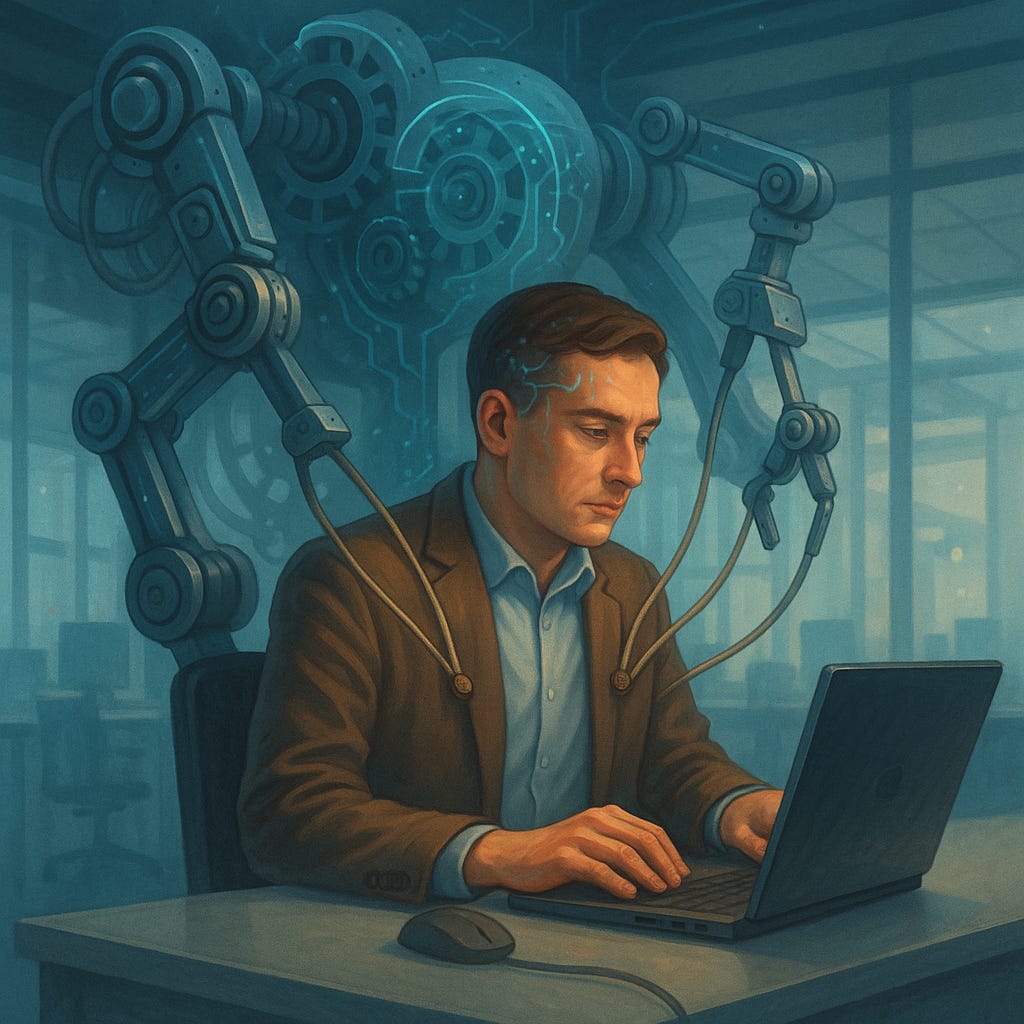
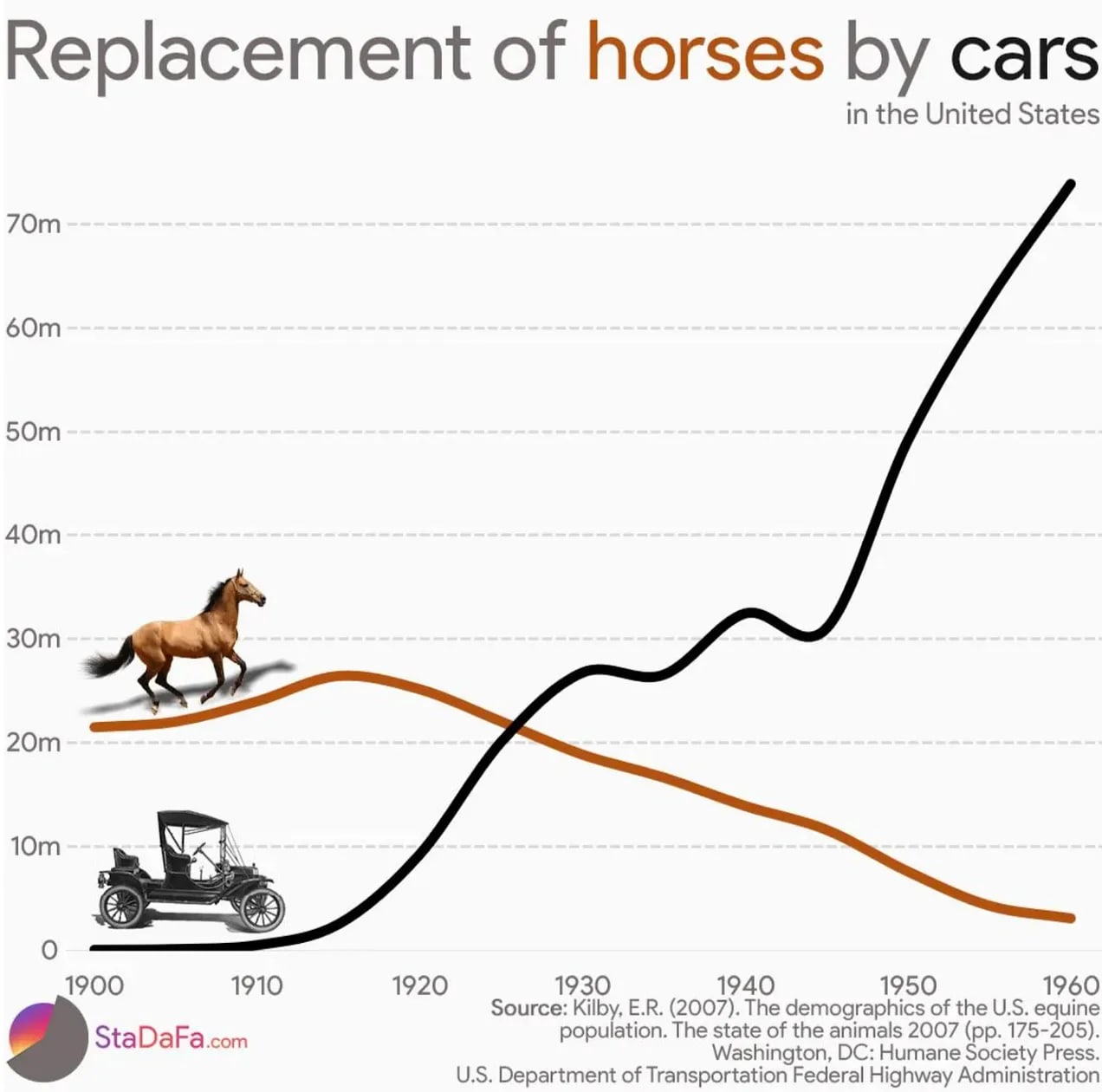
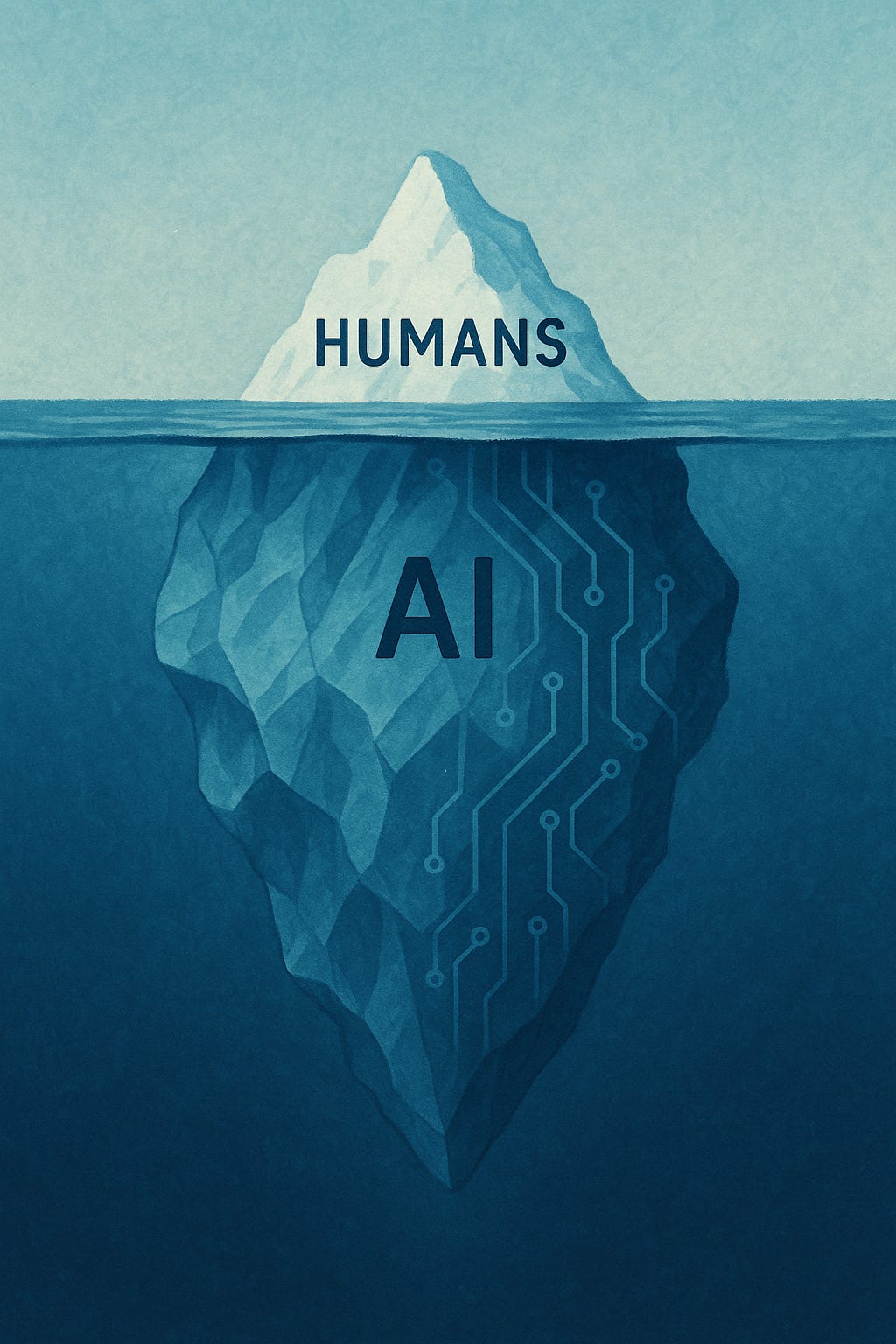
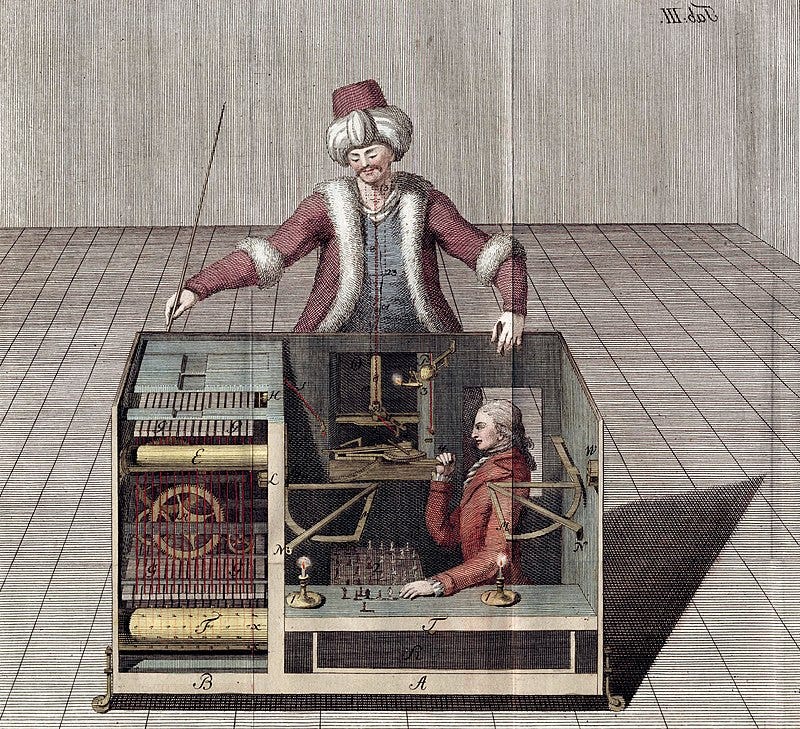
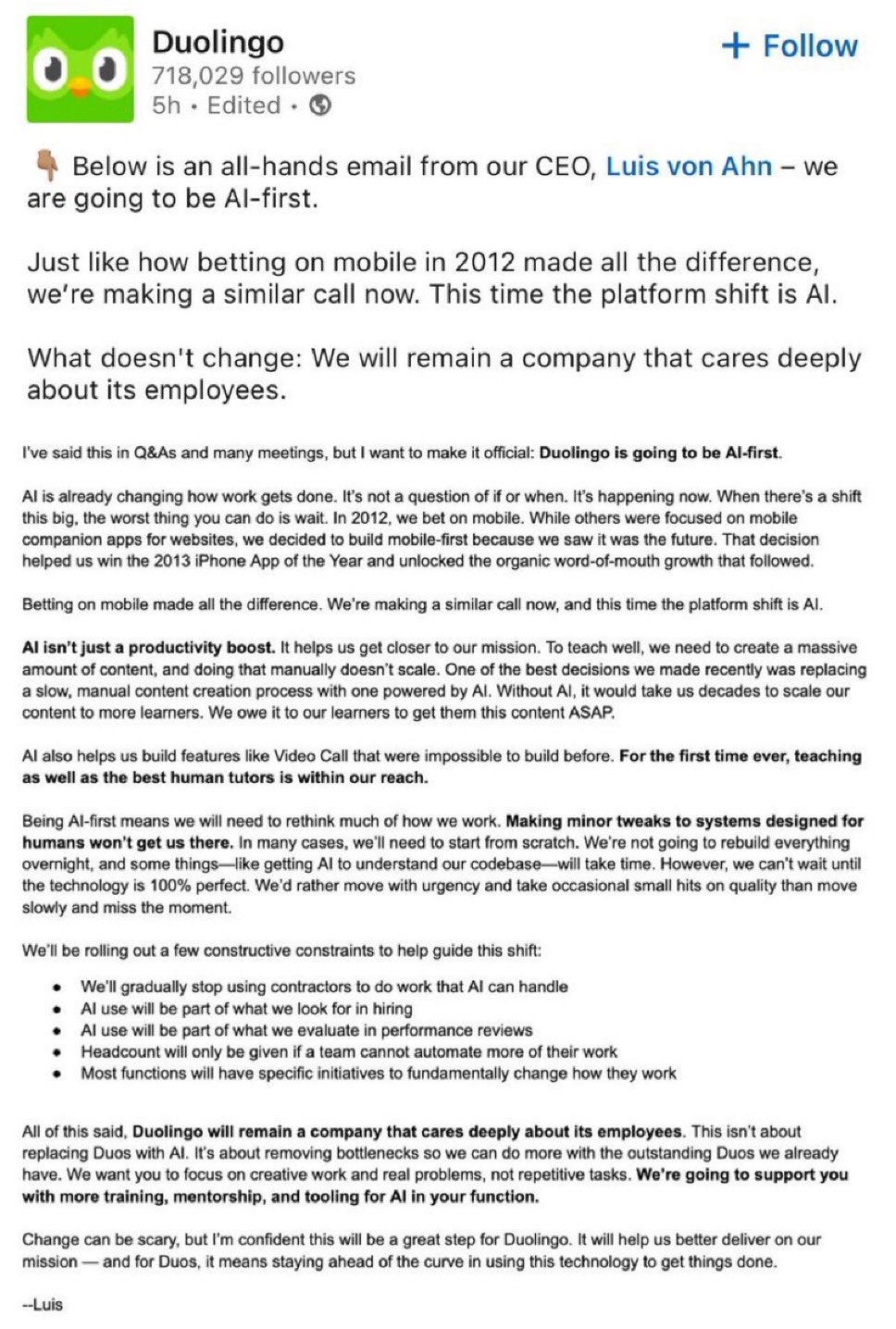
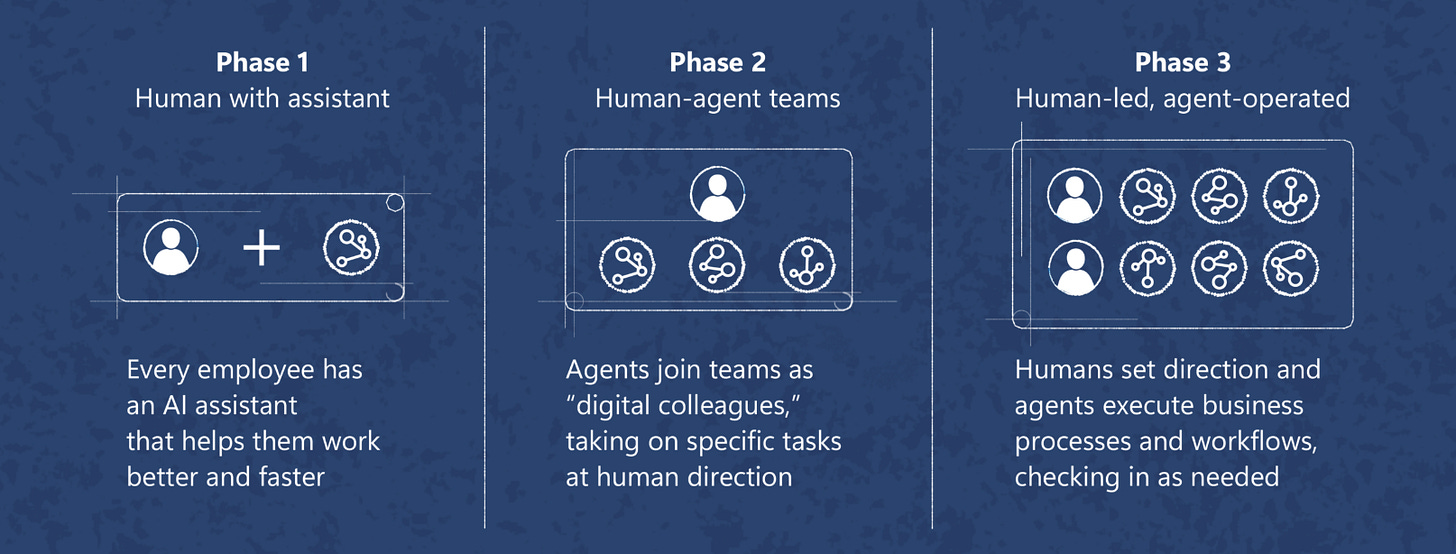

Still a lot of value in learning to fly a Cessna before the jetliner, and learning to work with the "pencil and paper" of you craft before anything else. If you skip this step you are forever at a loss on a bunch of dimensions.
Thanks for sharing. I’ve been wondering the same thing lately. The Microsoft research finding is very interesting — the follow-up question is how do we build the level of self-confidence needed to be not lazy with critical thinking